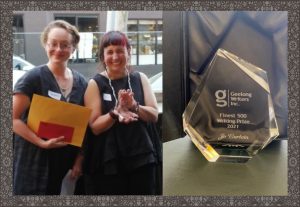FIRST PRIZE
Swimming with Sharks, by Jo Curtain
I have moved from the family home I (we) lived in for thirty years to a new, different space in Caloundra. As you’d imagine, packing up a house where so much living had happened was an ambitious, momentous task. I found going through my things a cathartic experience as I reconnected with stories I’d forgotten along the way to who I am today.
My photo albums were the most potent triggers, and as I turned the pages, I found myself crawling back into the past like a kind of time-travel and was delivered back into the nineteen-seventies.
Back when my youngest daughter was a boy, I rode a motorcycle. I saw the world. I tiptoed up mountains. I crept through fog. I stopped to swim in oceans that smelt of salty anchovies. I felt the biting chill of a winter wind and the soft caress of an early summer breeze. I danced with autumn leaves pirouetting of trees. I rode past giants’ frozen in time, thick gnarly feet deeply settled in the soft green-carpeted forest floor, their heads lost in the clouds. I avoided the cities; I never understood cities. I saw the world when my youngest daughter was a boy.
I did. I went out in the world exposed and without defences. I (we) sent Niamh out too, into the world, vulnerable, unprotected: bicycling across the wastelands, undeveloped land on the fringe of God’s country, to her school in Miami. The small school that laid at the feet of the hill. Notorious for harbouring marijuana crops.
Under a sky bruised with clouds, I imagined Niamh folded over her sandwich, sitting alone while other kids played bull-rush on the merciless asphalt. Her head in the ocean paddling to South Stradbroke. Across the gap between mainland and island, she didn’t think twice floating above a school of Bull sharks, dodging fishing trawlers through blood-streaked water. It was the time of Spielberg’s Jaws, and to some, sharks were a miscreation and an abomination. Niamh and her friends defied the status quo of the hunt and kill and shared the waters.
But Niamh. Our youngest of three children was no ordinary child; at the age of ten, she followed her da, Liam and sister, Siobhan, into the water at Wolf Rock, swimming with Leopard and Zebra sharks and the most maligned Grey Nurse. She showed a curious inclination for swimming with sharks. She kept her distance, quietly watched them gracefully cruise around her. She learnt. Niamh had a gift, able to look beyond the monstrous mythology. She saw creatures of incredible beauty and strength; I caught a glimpse of what she would become in those early years. Fearless. Determined. An agitator.
Those photos and other familiar objects have been part of my surroundings over the years and are indelibly part of me, like the people who have passed and are ongoing in my life. They will tell me when to let go. They stand for something bigger and deeper to come.
SECOND PLACE
Ignis Fatuus, by Geoffrey Gaskill
In the mosh pit of his mind Pete was a star, floating across the crowd, held up by a thousand hands, screams and cheers.
It lasted three minutes and thirty glorious seconds.
Except Pete wasn’t yet the star he knew he was destined to be. Bagatelle! All he had to do was write that elusive song. Three minutes and thirty seconds. That was all that radio and television would allow. It was also the length of a spot of that reality TV show. Line up the ducks and three minutes and thirty seconds would turn mosh pit dreaming into mish pit reality.
‘Songs are expressions of Art. They don’t recognise time,’ his sceptical friend Dylan told him.
‘Get with the programme,’ Pete retorted. ‘The times, my friend, are a’changing as your namesake would have it. But this time it’s all about the show, the business and the mathematics of music.
Pete had eyes for the prize and the prize involved three minutes and thirty seconds of time. Then his humdrum mosh pit bedroom dreaming would take him to la dolce vitas of London, New York, Paris …
He submitted his application and audition tape. ‘It’s a short cut,’ Pete said when an aghast Dylan asked why.
‘Of course, Dylan sneered. ‘Why waste time paying your dues when your pretty face will carry you to superstardom.’
‘You are a cynic,’ said Pete.
‘You have the morals of a musical prostitute. Did they accept you?’
Pete shrugged. ‘They wouldn’t know talent if they fell over it,’ said Pete. ‘But, one door closes, another opens. It’s just a matter of time.’
‘Talent is a gift but needs work …’
‘You’re a bit of a moralist when it suited you,’ Pete interrupted.
Dylan ignored the gibe. ‘… Years of work. You are lazy and TV can’t give you what you don’t have.’
‘Didn’t you read the review of our school musical production in the local paper? A star is born. That’s what it said. Me, a star.’
‘Believing your own publicity is a recipe for heartache,’ Dylan said.
Pete shook his head. ‘Oh, ye of little faith. The poster for auditions said they’re on the lookout for the next big thing. That’s what the time are a’changing means. The old road is just that – old.’
‘I give up,’ said Dylan.
‘Genius,’ Pete declared, ‘is one percent inspiration and ninety-nine percent perspiration. All I’ve got to do is find those ones – one lousy song, one elusive melody, one middle eight and one hook. My spot on TV will be my foot in the door.’
‘But they didn’t accept you!’
Pete pshawed. In the mosh pit of his mind he was already a star, floating across the crowd, held up by a thousand hands, screams and cheers. The times were always a’changing. Except this time, he, the star of the school musical, was going to be the one a’changing them.
And all in just three minutes and thirty glorious seconds.
THIRD PLACE
We All Die, by Paul Bucci
He crept closer to the edge and raised his head to the level of the parapet so he could see the road below. His target was drinking coffee and talking with a young woman. Maybe his daughter. Maybe his lover. No matter. A job was a job. He rested the rifle on the stone wall and took aim. An easy shot really and easy money for an old pro like himself. The trigger squeezed, the head exploded, the bakery in turmoil. He slid back from the parapet, crawled to the back of the roof, took the rifle apart, stashed it in his bag and stepped back down the stairs. Another job done.
Later, the next day in fact, he read about it in the paper. His work was described as a “professional hit job”. And why not? A man had died – painlessly. We all die. Today, tomorrow, sometime. Not all painlessly though, not all instantly. Few without trauma. Plenty of others would have died yesterday too – alone, unnoticed, unhappy perhaps. And tomorrow? Whose turn tomorrow?
A few days later he went to the bakery, got a take away latte and a date scone and sat on a bench on the corner of the street, watching, listening. The job he did for the money. This bit for the pleasure. Lots of passersby, onlookers, the also-rans – talking, hovering, lapping it up, keen to feel a part of it, expressing opinions, their lives enriched. By him. He felt quite proud of himself. Bringing so much more to their empty lives. Nothing is either all good nor all bad.
But – and it was a big but really – he felt the time had come to give it all away. Like a lot of things in life technology was taking over, new practices outpacing the old. Taking people out was like everything else in that regard. A shot to the head was no longer the preferred method. It was all a bit old hat really. And to be fair it was messy. Not everyone wanted to be a part of that. And there were other ways, easier ways. Poison on the tip of an umbrella was a much more elegant method, for example. With the added bonus, of course, that nobody gets stopped for carrying an umbrella.
Munching on his scone he thought of all the other new issues – CCTV cameras were everywhere now, DNA testing, facial recognition, phone tracing and so on. Things he probably had no idea about too. And the other side to it all was that the methods the cops and other agencies were using were increasingly more sophisticated. He’d been very careful so far, lucky perhaps. But.
And he’d been doing this for over 20 years now if he included his time in the army. Twenty years! Time to move on he thought. Time to move on. But that’s when the date stone got stuck in his throat – or was it a fragment of bone … ???
ABOUT THE JUDGE
Sarah Walker is a Geelong-based writer, artist and photographer. She makes work about anxiety, control and intimacy in text, video and immersive audio across Australia and internationally. She is a Walkley-nominated essayist and critic. Her debut essay collection, The First Time I Thought I Was Dying, won the 2021 Quentin Bryce Award. Read more about Sarah and her work here.



Leave a Reply